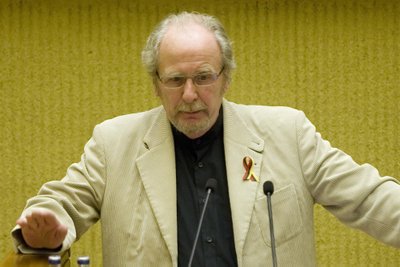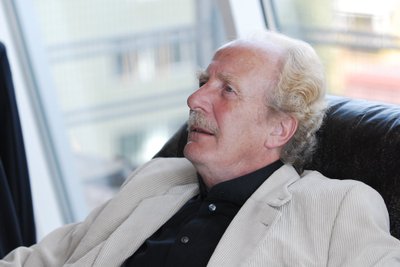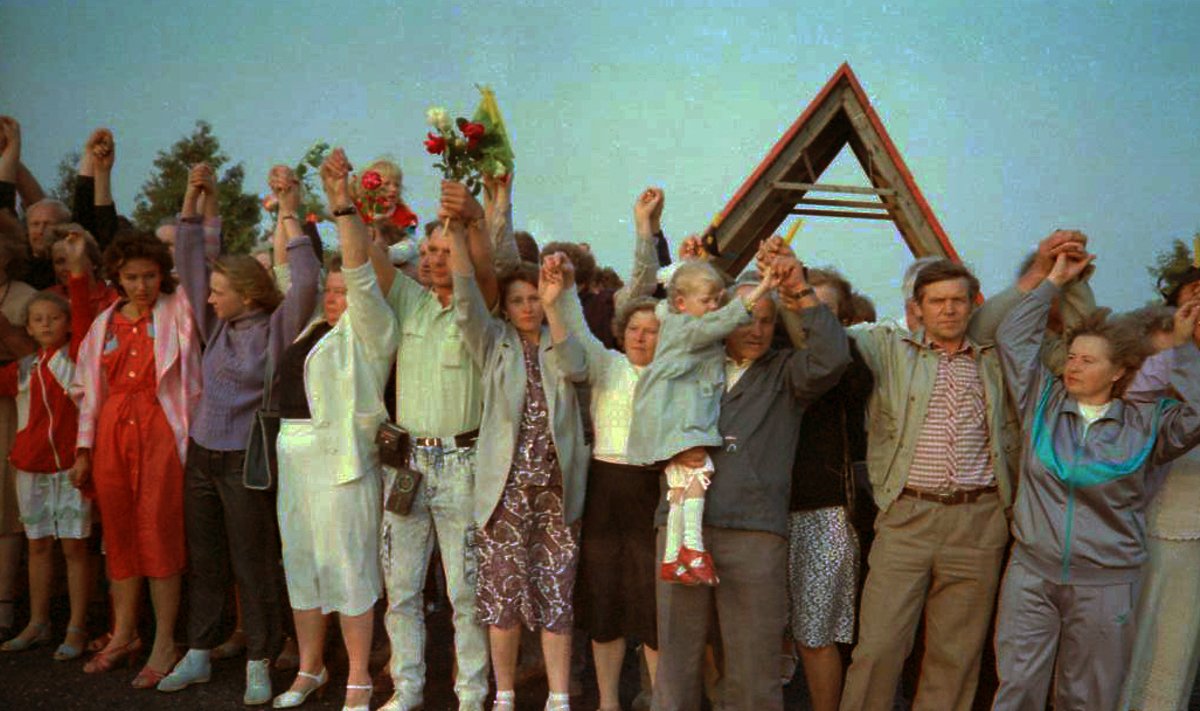Two events, that caught the imagination of the outside world, did more than anything else to change this attitude: One was the „Singing revolution“ in June 1988. The world had known cases of Gandhian civil disobedience against injustice before – but singing oneself to freedom was a novelty.
The other event, which made it onto the front pages and the TV- screens around the globe, was the human chain of August 1989: One million people holding hands, from Tallinn in the North to Vilnius in the South, to protest against the Molotov/Ribbentrop pact and its secret protocols from half a century before. This infamous pact between the two dictators, Hitler and Stalin, signalled the beginning of the Second World War; and gave Stalin a free hand to invade the Baltic countries, including Finland.
The Singing revolution did not only signal a national reawakening. It was a symbol of powerful grassroots democracy. The leaders of the independence movements – the Popular Fronts of Estonia, Latvia and Lithuania – had therefore every reason to believe that they would be welcomed with open arms back into the family of European democracies.

But they were in for a rude awakening. When they sent their representatives abroad to solicit recognition of their restored democracies, they were received with polite annoyance. The restoration of independence for the Baltic States – which implied breaking away from the Soviet Union – did not fit in with the scheme of things, which Western leaders were negotiating in partnership with Mr. Gorbachev to end the Cold War. Gradually it dawned upon men like Lennart Meri and Vytautas Landsbergis that they were being treated as unwelcome intruders into the amiable fraternity of the major powers, which simply had a different agenda.
Unknowingly, the Baltic independence movements had put the leaders of Western democracy upon the horns of a dilemma of their own creation, from which they couldn´t disentangle themselves – without outside help. This is a chapter in the story of the endgame of the Cold War, which the major powers in the West understandably want to forget, but the current masters in the Kremlin are by the same token unable to forget. This is the untold story of the documentary film, „Those Who Dare…“, we are now going to watch.
First: we must acknowledge that the Singing Revolution could not have gathered momentum, were it not for Gorbachev´s policy of Glasnost and Perestroika – his signatory trade marks for opening up and structural reform. Even if the opening up was both timid and limited and the structural reform never really materialized, Mr. Gorbachev, by ultimately refusing to use force to keep the Soviet Union together, made it all possible.
Second: if successful in breaking away from the Soviet Union, the Baltic States could signal the beginning of the end of the empire. Not only would such „political tsunami“ engulf Mr. Gorbachev himself, but the Communist Party of the Soviet Union as well.
Of course, we were all questioning ourselves at the time if such a tremendous transformation could happen peacefully. Or would the break-up of empire unleash a bitter war, with unforeseeable consequences? For a while, we were teetering on the brink.
Third: the leaders of the West at the time – Bush sr., Kohl, Mitterand and the Iron Lady, Mrs. Thatcher – had all staked the success of their policy of ending the Cold War on the political fate of a single individual, Mr. Gorbachev. If he were to be deposed – they thought – the hardliners would be back. That would mean a return to the Cold War, and – in the worst case scenario – an escalation into full blown war.
Forth: there was a lot at stake: Disarmament – both nuclear and conventional; reduction in military forces and arms control; the peaceful reunification of Germany and united Germany´s continued membership of NATO; the liberation of the nations of Central and Eastern Europe; mutual hopes for „a peace dividend“, to name but a few.
For the Soviet leader, Mr. Gorbachev, preventing the break-up of the Soviet Union was his last line of defence. If that line wouldn´t hold, everything else would go with it.

The leaders of the West found themselves facing a tough choice: Should all the afore-mentioned benefits of ending the Cold War be sacrificed by supporting the small Baltic nations´dreams of restored independence? Or should they – in the name of maintaining peace and stability – sacrifice the dreams of those small nations – at least for the time being?
There was an almost unbridgeable gap between the official, idealistic rhetoric about the expansion of democracy, human rights and the rule of law – and the coldblooded realpolitik being pursued de facto behind closed doors.
This is why President Bush gave his infamous „Chicken Speech“ in Kyiv in 1991. Appealing to the Ukrainians „not to succumb to extreme nationalism“, but to keep the Soviet Union together – in the name of peace and stability.
This is why Chancellor Kohl and president Mitterand wrote a joint letter to president Landsbergis, urging him to postpone the implementation of Lithuania´s declaration of independence of March 11, 1990.
This is why the leaders of the restored Baltic democracies were turned away from conferences, where the „New World Order“ was being negotiated between the old Cold War adversaries; they were not even allowed to plead their case at a conference in Copenhagen on human rights, as potential „spoilers of the peace“.
But why Iceland? There was no vital national interest involved. On the contrary: Iceland was dependent upon the Soviet Union for oil and gas – the lifeblood of any developed economy – since the British placed an embargo upon Iceland during the cod wars in the fifties. And didn´t we know that small nations are supposed to seek shelter with and follow the leadership of the major powers? In other words, behave themselves.
All of this was well known. But nonetheless, we were reluctant followers. The leaders of the West were obviously pursuing their own agenda. We were simply convinced that the Western infatuation with Mr. Gorbachev was ill-conceived and dangerous and based on a fundamentally faulty analysis of political reality inside the Soviet Union.
I was convinced that the Soviet system itself was in the throes of an existential crisis, for which its leaders had no solution. The empire was in the process of falling apart, just as had been the fate of the British, French and other European empires after World War ll.
Contrary to Putin – who is on record saying that „the fall of the Soviet Union was the greatest geo-strategic catastrophe of the 20th century“ – I was convinced – and still am – that the dissolution of the Soviet Union should be welcomed as perhaps the most beneficial event of the 20th century. If it needed a little push from the Baltic nations, so much the better.
What had the Cold War been all about, if not the liberation of the captive nations? I was appalled listening to Western leaders preach to the subjugated peoples that they should accept their fate as captive nations – so that we in the West could enjoy peace and stability. To my ears, this was not only a shameful betrayal – but also a blatant mistake.
When recounting this story, almost a quarter century later, many questions remain unanswered. One of them is this one: Were the leaders of Western democracy really so callous as to be ready to sacrifice the legitimate claims of the Baltic nations to restore independence – in return for political gain in dealing with the Soviets? Although it looks like it, it is perhaps a little more subtle.
Keep in mind that the Baltic nations had disappeared from the political radar screen for almost half a century. In that sense, they had become „forgotten nations“. „Haven´t these peoples always belonged to Russia anyway?“ – as the distinguished foreign minister of a NATO-country said to me – and I quoted before.
If this was really the accepted view in the chancelleries of Europe, Western leaders were, presumably, not thinking in terms of sacrificing anything. Bear in mind that most of those major powers in the West – the U.K., France, Spain and also the US – were all ex-colonial powers. The US suffered a devastating civil war to prevent the break-up of the union. I am not for a moment suggesting that the American Civil War, with the aim of emancipating the slaves, should be compared with imperial aggression with the aim of enslaving free nations. But, preventing the break-up of the union was a common principle.
The United Kingdom today is in the grip of an existential crisis – as is Spain – in mortal fear of the break-up of the union. Colonial powers – think of the British, the French and the Spanish empires – have fought ferocious wars trying to prevent the break- up of their empires.
The leaders of major powers with a colonial past are not to be expected to be at the forefront in defending the rights of small nations to national self-determination. Rarely have small nations been liberated by a benevolent act of major powers. They simply have to liberate themselves. Under such circumstances, the concept of „solidarity of small nations“ may have some practical relevance, against all odds.
